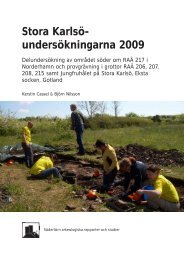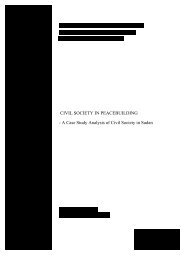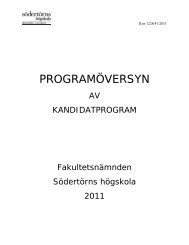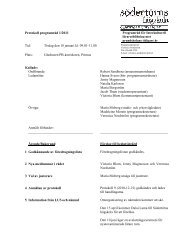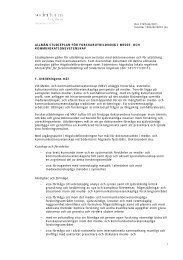- Page 1:
Ansökan från Södertörns högsko
- Page 5 and 6:
Innehållsförteckning: 1. Område
- Page 7 and 8:
1. Område och forskarutbildningsä
- Page 9 and 10:
Som grund för området Politik, ek
- Page 11 and 12:
I praktiken har vi således redan i
- Page 13 and 14:
• Europaprogrammet (sociologi och
- Page 15 and 16:
temaarbetet vid CBEES som kommer et
- Page 17 and 18:
tillsättning: två i företagsekon
- Page 19 and 20:
övergripande strategier. Utifrån
- Page 21 and 22:
att det finns synergieffekter inom
- Page 23 and 24:
handledarkollegiet, jämte handleda
- Page 25 and 26:
För området inrättas förutom en
- Page 27 and 28:
Företagsekonomi i Sverige (FEKIS)
- Page 29 and 30:
även magister- och masterstudenter
- Page 31 and 32:
då nyrekryterade lektorer sedan 20
- Page 33 and 34:
Forskarutbildningen sker för närv
- Page 35 and 36:
disputerat i statsvetenskap, fyra m
- Page 37 and 38:
delas av flera av forskarna handlar
- Page 39 and 40:
4. ”Analys av det nationella inku
- Page 41 and 42:
7. Projektet ”Ohälsosamma samhä
- Page 43 and 44:
3. Nicholas Aylott: The Nordic Mode
- Page 45 and 46:
vetenskaplig grund och att högskol
- Page 47 and 48:
I riktlinjerna fastslås även att
- Page 49 and 50:
när det gäller forskning och fors
- Page 51 and 52:
uppdelade på ämnesområden. Den d
- Page 53 and 54:
Indexerar tidskrifter inom politik
- Page 55 and 56:
Arbetsplatser, kommunikation och IT
- Page 57:
När det gäller rekryteringen mås
- Page 60 and 61:
Tabeller Fredrika Björklund Lektor
- Page 62 and 63:
Tabeller Lia Antoniou Lektor Ph.D.
- Page 65 and 66:
Tabeller TABELL 4. ANTAL DOKTORANDE
- Page 67 and 68:
www.sh.se Södertörns högskola 14
- Page 69 and 70:
5 De första dryga tio åren vid S
- Page 71 and 72:
8 9 Högskolans forskning Högskola
- Page 73 and 74:
12 13 gripande program som beställ
- Page 75 and 76:
16 17 under 2008 och under den efte
- Page 77 and 78:
Bilaga B ALLMÄN STUDIEPLAN FÖR FO
- Page 79 and 80:
Bilaga B Vetenskaplig avhandling
- Page 81 and 82:
Bilaga B 1. studentens meriter, kom
- Page 83 and 84:
Bilaga B Doktoranden har rätt till
- Page 85 and 86:
Bilaga B i beviset eller i betygsn
- Page 87 and 88:
Bilaga B i samhället och människo
- Page 89 and 90:
Bilaga B Utlysning Antagning till u
- Page 91 and 92:
Bilaga B into the Baltic Sea Region
- Page 93 and 94:
Bilaga B Doktorsavhandlingen ska f
- Page 95 and 96:
Bilaga B Vetenskaplig avhandling
- Page 97 and 98:
Bilaga B Utlysning Antagning till u
- Page 99 and 100:
Bilaga B Kursen syftar dels till at
- Page 101 and 102:
Bilaga B Prov Varje kurs inom utbil
- Page 103:
Bilaga C Avtal
- Page 146 and 147:
Bilaga D som handledare till tre an
- Page 148 and 149:
Bilaga D Karl Gratzer (professor) F
- Page 150 and 151:
Bilaga D Årliga medverkan i Småf
- Page 152 and 153:
Bilaga D avhandlingar såväl i fö
- Page 154 and 155:
Bilaga D Peter Lindelöf (docent) F
- Page 156 and 157:
Bilaga D 1999 - 2002 Research proje
- Page 158 and 159:
Bilaga D (2005 - 2006 ). Evaluator
- Page 160 and 161:
Bilaga D Mikael Lönnborg (fil.dr.)
- Page 162 and 163:
Bilaga D Curt Scheutz (docent) Föd
- Page 164 and 165:
Bilaga D För närvarande: EU Direc
- Page 166 and 167:
Bilaga D Cheick Wagué (professor)
- Page 168 and 169:
Bilaga D Planning and Organizing Co
- Page 170 and 171:
Bilaga D Medlem i styrelsen för SU
- Page 172 and 173:
Bilaga D ÄMNE: Sociologi Paavo Ber
- Page 174 and 175:
Bilaga D Ledamot av betygsnämnden,
- Page 176 and 177:
Bilaga D Jonas Lindberg, huvudhandl
- Page 178 and 179:
Bilaga D Beviljade externa forsknin
- Page 180 and 181:
Bilaga D Stockholms universitet 29/
- Page 182 and 183:
Bilaga D Extern sakkunnig,forskaras
- Page 184 and 185:
Bilaga D Ilkka Henrik Mäkinen (pro
- Page 186 and 187:
Bilaga D Institutionsstyrelse vid S
- Page 188 and 189:
Bilaga D Föredrag vid Finlands Amb
- Page 190 and 191:
Bilaga D programme (med prof. Kerst
- Page 192 and 193:
Bilaga D Key resource person, med P
- Page 194 and 195:
Bilaga D 2007 Programansvarig för
- Page 196 and 197:
Bilaga D Nicholas Aylott (docent) F
- Page 198 and 199:
Bilaga D arrangerade av Studieförb
- Page 200 and 201:
Bilaga D Advisor) Persson, Åsa, No
- Page 202 and 203:
Bilaga D metodologiska problem som
- Page 204 and 205:
Bilaga D Sakkunniguppdrag: Bedömni
- Page 206 and 207:
Bilaga D Erfarenhet av andra uppdra
- Page 208 and 209:
Bilaga D Yonhyok Choe (docent) Föd
- Page 210 and 211:
Bilaga D Asian Reform Politics”,
- Page 212 and 213:
Bilaga D Under min tid som projekta
- Page 214 and 215:
Bilaga D 2009. Deltagare och föred
- Page 216 and 217:
Bilaga D Processes Influencing Demo
- Page 218 and 219:
Bilaga D Education Study (ICCS). Pr
- Page 220 and 221:
Bilaga D Johan Eriksson (docent) F
- Page 222 and 223:
Bilaga D institutionen: Mikael Blom
- Page 224 and 225:
Bilaga D Information om forskning o
- Page 226 and 227:
Bilaga D Karl Magnus Johansson (doc
- Page 228 and 229:
Bilaga D European Court of Justice
- Page 230 and 231:
Bilaga D Medverkan i panel vid konf
- Page 232 and 233:
Bilaga D Ann-Cathrine Jungar (docen
- Page 234 and 235:
Bilaga D Beviljade externa forsknin
- Page 236 and 237:
Bilaga D Sakkunnig på fyra doktora
- Page 238 and 239:
Bilaga D Mai-Brith Schartau (docent
- Page 240 and 241:
Bilaga D obligatoriska vistelser vi
- Page 242 and 243:
Bilaga D Tysklandsstudie, 2002 - Vi
- Page 244 and 245:
Bilaga D konsortium (A) komplettera
- Page 246 and 247:
Bilaga E Karl Gratzer (Professor) B
- Page 248 and 249:
Bilaga E Jacobssson, B., 2005. Vilk
- Page 250 and 251:
Bilaga E Lindelöf, P., & Löfsten,
- Page 252 and 253:
Bilaga E Palgrave Macmillan, Palgra
- Page 254 and 255:
Bilaga E Artiklar i uppslagsverk/en
- Page 256 and 257:
Bilaga E Yohanan Stryjan (Professor
- Page 258 and 259:
Bilaga E Besrat Tesfaye (Docent) Ar
- Page 260 and 261:
Bilaga E • “Economic Convergenc
- Page 262 and 263:
Bilaga E Jan Öhrming (Professor) B
- Page 264 and 265:
Bilaga E Sven Hort (Professor) Böc
- Page 266 and 267:
Bilaga E Kerstin Jacobsson (Profess
- Page 268 and 269:
Bilaga E Ekengren, Magnus & Kerstin
- Page 270 and 271:
Bilaga E Ovanstående finns även p
- Page 272 and 273:
Bilaga E ÄMNE: Statsvetenskap Hans
- Page 274 and 275:
Bilaga E Nicholas Aylott (Docent) B
- Page 276 and 277:
Bilaga E - (2001), review of Tom Ch
- Page 278 and 279:
Bilaga E Democratic Life Cycle in W
- Page 280 and 281:
Bilaga E Fredrika Björklund (Docen
- Page 282 and 283:
Bilaga E Yonhyok Choe (Docent) Böc
- Page 284 and 285:
Bilaga E Joakim Ekman (Docent) Böc
- Page 286 and 287:
Bilaga E Kapitel i redigerade volym
- Page 288 and 289:
Bilaga E Johan Eriksson (Docent) B
- Page 290 and 291:
Bilaga E Hotbilder på dagordningen
- Page 292 and 293:
Bilaga E Europeiska unionen. I Jako
- Page 294 and 295:
Bilaga E Ann-Cathrine Jungar (Docen
- Page 296 and 297:
Bilaga E Michael Karlsson (Docent)
- Page 298 and 299:
Bilaga E Mai-Brith Schartau (Docent
- Page 300 and 301:
Bilaga E Peter Strandbrink (Fil.dr,
- Page 302 and 303:
Bilaga F Management- och datakonsul
- Page 304 and 305:
Bilaga F in forskningsmedel. Forskn
- Page 306 and 307:
Bilaga F Opponent slutseminarium, m
- Page 308 and 309:
Bilaga F Anders Ivarsson Westerberg
- Page 310 and 311:
Bilaga F Utom högskolan:s Marknads
- Page 312 and 313:
Bilaga F Jurek Millak (fil.dr) Föd
- Page 314 and 315:
Bilaga F Jenny Svensson (ek.dr) Fö
- Page 316 and 317:
Bilaga F Lars Vigerland (ek.dr) Fö
- Page 318 and 319:
Bilaga F Renate Åkerhielm (fil. dr
- Page 320 and 321:
Bilaga F Christina Axelsson (fil. d
- Page 322 and 323:
Bilaga F Eva Christenson (fil.dr) F
- Page 324 and 325:
Bilaga F Sara Ferlander (fil.dr) F
- Page 326 and 327:
Bilaga F 2007. Östersjöstiftelsen
- Page 328 and 329:
Bilaga F conference, Tartu 17-19 Se
- Page 330 and 331:
Bilaga F Anita Heber (fil.dr) Föde
- Page 332 and 333:
Bilaga F Inequalities in Morbidity
- Page 334 and 335:
Bilaga F Steven Saxonberg (professo
- Page 336 and 337:
Bilaga F Denny Vågerö (professor)
- Page 338 and 339: Bilaga F Magnus Wennerhag (fil.dr)
- Page 340 and 341: Bilaga F Anders Nordström (fil.dr)
- Page 342 and 343: Bilaga F Pelle Åberg (fil.dr) Föd
- Page 344 and 345: Bilaga G Marcus Box Böcker New Ven
- Page 346 and 347: Bilaga G Anders Ivarsson Westerberg
- Page 348 and 349: Bilaga G Ann-Sofie Köping Olsson B
- Page 350 and 351: Bilaga G Jurek Millak Kapitel i red
- Page 352 and 353: Bilaga G Smolander (Popova), Maria
- Page 354 and 355: Bilaga G Klara Tomson Böcker Tomso
- Page 356 and 357: Bilaga G Renate Åkerhielm Böcker
- Page 358 and 359: Bilaga G Christina Axelsson Övriga
- Page 360 and 361: Bilaga G Abbas Emami Böcker Emami,
- Page 362 and 363: Bilaga G Michael Gentile Böcker T.
- Page 364 and 365: Bilaga G Ali Hajighasemi Böcker 20
- Page 366 and 367: Bilaga G Elzbieta Korolczuk Böcker
- Page 368 and 369: Bilaga G Vågerö D, Leinsalu M. He
- Page 370 and 371: Bilaga G “Beyond the Transitology
- Page 372 and 373: Bilaga G Sweden” in Bogdan Szajko
- Page 374 and 375: Bilaga G women who survived the sie
- Page 376 and 377: Bilaga G Magnus Wennerhag Böcker M
- Page 378 and 379: Bilaga G Anders Nordström Böcker
- Page 380 and 381: Bilaga G Pelle Åberg Böcker Trans
- Page 382 and 383: Bilaga H A sociological study, Stoc
- Page 384 and 385: Bilaga I 4. Course contents, module
- Page 386 and 387: Bilaga I förhållningssätt till o
- Page 390 and 391: Bilaga I Klotz, Audie and Deepa Pra
- Page 392 and 393: Bilaga I • Förmåga att inta ett
- Page 394 and 395: Bilaga I Syllabus CONTEMPORARY RESE
- Page 396 and 397: Bilaga I ISBN-10: 0801475937 Kõll.
- Page 398 and 399: Bilaga I forskningsproblem Värderi
- Page 400 and 401: Bilaga I Kursplan MODERN SOCIOLOGIS
- Page 402 and 403: Bilaga I human action, Acta Sociolo
- Page 404 and 405: Bilaga I more immediate relevance f
- Page 406 and 407: Bilaga I Syllabus RESEARCH DESIGN,
- Page 409 and 410: Bilaga J FÖRSLAG TILL RIKTLINJER F
- Page 411 and 412: Bilaga J • Om högskolan annonser
- Page 413 and 414: Bilaga J • Finansieringsplanen j
- Page 415 and 416: Bilaga J 3. Allmän studieplan För
- Page 417 and 418: Bilaga J 4. Individuell studieplan
- Page 419 and 420: Bilaga J 5. Handledning Författnin
- Page 421 and 422: Bilaga J 6. Indragande av resurser
- Page 423 and 424: Bilaga J 7. Betyg på prov, samt re
- Page 425 and 426: Bilaga J • En ersättare ska allt
- Page 427 and 428: BM 20100209 Mall för individuell s
- Page 429 and 430: Individuell studieplan Södertörns
- Page 431: Plan och rapportering termin X Arbe



